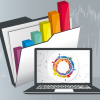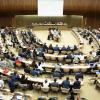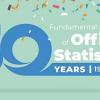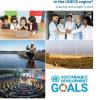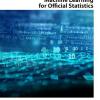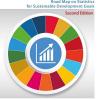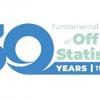Press Releases
Displaying Results 1 - 25 of 63
Moving to a more circular economy is increasingly recognized as vital to sustainable development, decarbonization, resource efficiency and competitiveness. More and more countries are adopting national policies that are directly or indirectly related to the sustainable management of natural
Efforts to reach the Sustainable Development Goals (SDGs) by 2030 are facing strong headwinds from the impacts of the COVID-19 pandemic, shocks arising from climate change and the war against Ukraine, high interest rates and still-elevated inflation.
New data available for this year’s report on
In her first visit to Brussels as UNECE Executive Secretary, Tatiana Molcean held strategic discussions this week with European Commissioners for environment and energy, and high-level officials responsible for industrial policy, trade and cooperation with EU acceding, candidate and neighbouring
Amid the proliferation of data related to climate change, the international statistical community has called at COP28 for greater coordination to improve statistics, address persistent gaps, and to fully leverage existing data systems for urgent climate action. This, as stressed in discussions
In half of countries in Europe, North America and Central Asia with data, the belief that it is justifiable for a man to beat his wife is becoming more widespread.
This worrying trend stands out among the findings of the recent review of progress in the UNECE region towards priorities defined in
With the wider European region facing the impacts of several overlapping crises, including the aftermath of the COVID-19 pandemic and the ripple effects of the war in Ukraine and other conflicts in the region, speakers at a high-level regional population conference in Geneva today stressed that
In the face of multiple intersecting crises in the region, UNECE member States must redouble efforts to avert a further crisis of sustainable development, according to the SDG status report released today.
The report, Growing Challenges for Sustainable Development:
In the largest ever effort of its kind, a multi-year UNECE project has kicked off to produce internationally agreed guidance and advice for conducting the next round of censuses, foreseen around 2030.
Censuses and the information they provide on populations, their distributions and
UNECE is releasing guidance to help producers of official statistics to produce synthetic data.
Data creates value by guiding the decisions of governments, businesses and individuals. This value is often described in terms of the insights contained within these data, which can, among other things
To help countries and researchers meet the complex challenges of measuring people on the move, UNECE has today released a study on the use of new data sources for measuring international migration, ahead of the International Migrants Day (18 December).
Migration is an emotive topic that takes
New Guidance from UNECE, Statistics on Children: Spotlight on children exposed to violence, in alternative care, and with disabilities, published today, will support countries in producing statistics on children in the most vulnerable situations.
There is an evident global consensus around the
Chief Statisticians from across and beyond the UNECE region, taking part in this week’s 70th plenary session of the Conference of European Statisticians, have today adopted a Position statement on access to data held by the private sector for purposes of official statistics, publicly affirming
Thirty years after UNECE’s adoption of the Fundamental Principles of Official Statistics, formulated by the Conference of European Statisticians (CES), the same body gathers this week in Geneva to continue its essential and ever-evolving work. Chief statisticians and national statistical offices
A new publication released today by UNECE, Approaches to Measuring Social Exclusion, examines the many and varied ways in which statistics can assess progress towards the policy goal of leaving no-one behind.
Social exclusion, or being left out of societal processes and structures, often goes hand
As we approach the halfway mark between the adoption and finish line of the 2030 Agenda for Sustainable Development, the region is on track to achieve only 26 of 169 SDG targets, according to the UNECE 2022 SDG progress report released today. For all other measurable targets, the region must
A UNECE guide, Machine Learning for Official Statistics, released today, will help national and international statistical organizations to harness the power of machine learning (ML) to modernize the production of official statistics.
As found by a 2021 project led by the United Kingdom and UNECE,
The Conference of European Statisticians Framework on Waste Statistics, published today by UNECE, provides a new perspective on defining and measuring the waste products of our economies.
Every household, enterprise and institution produces waste.
If not properly dealt with, this waste can pose a
The second edition of UNECE’s Road Map on Statistics for Sustainable Development Goals, released today, provides comprehensive guidance for countries to help them strengthen their systems for producing and disseminating data on the SDGs.
In 2015 the world embarked on a journey to the future, to
2022 marks 30 years since the Fundamental Principles of Official Statistics, now a General Assembly-endorsed global standard, were first developed and adopted at the United Nations Economic Commission for Europe (UNECE).
Created by the Conference of European Statisticians, UNECE’s highest decision
Governments, businesses and individuals around the world are increasingly recognizing that the way our economies function cannot be sustained if we are to stem the tide of climate change, resource depletion and biodiversity loss and reduce our negative impacts on the environment. A more
When we read or hear official figures, such as the rate of inflation, the level of unemployment or the size of our country’s population, we expect to be able to trust in the accuracy of these figures. We want to be able to use them with confidence to inform our decisions.
We also expect the
New Guidelines issued today by UNECE will support countries in maintaining high quality as they move towards using modern data sources in their censuses.
Knowing the number of people in a population, their distribution across the country, and their basic characteristics such as age, sex and
The Bureau of the Conference of European Statisticians (CES), UNECE’s statistical decision-making body, has released new guidance for measuring the impact of the Covid-19 pandemic on women and men.
From the moment that countries began imposing restrictions in a bid to flatten the curve of the
UNECE’s new Transport Statistics Infocard offers a new, user-friendly country-by-country perspective on important transport topics that are needed to inform policy decisions: road safety, numbers of cars and length of railways, alternative fuel use and public transport.
Across the UNECE region
UNECE today publishes a Set of Core Climate Change-related Indicators and Statistics, along with a set of Implementation Guidelines, both endorsed by the Conference of European Statisticians (CES).
Climate change is an existential threat and poses an immense challenge for humanity. A better


